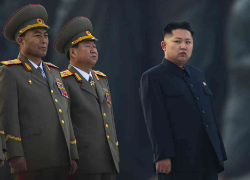On April 15, 2013, North Korea celebrated the 101st birthday of its founding leader, Kim Il Sung. The day was filled with flowers to honor both its founder and current leader, Kim Jong Un; however, North Korea did not take a reprieve from threatening South Korea and the United Nations. From Pyongyang, North Korea’s capital, the KCNA reported that “[o]ur retaliatory action will start without any notice from now.” Pyongyang’s comments were directed at South Korea’s protest to the celebrations.

(NPR)
This is the latest in a long line of threats North Korea has directed at the United Nations and its member countries. Just a few days ago, Pyongyang threatened that “Japan is always in the cross-hairs of our revolutionary army and if Japan makes a slightest move, the spark of war will touch Japan first.” North Korea warned that Tokyo would be the first city targeted for a nuclear strike.
While North Korea continues to threaten the United Nations, member countries Japan and the United States remain positive that a peaceful resolution can be reached through talks. U.S. Secretary of State John Kerry urged the regime in North Korea to stop its nuclear program and hold talks with the United States and Japan. In response, the KCNA cited North Korea’s military leaders, stating, “If the puppet authorities truly want dialogue and negotiations, they should apologize for all anti-DPRK hostile acts, big and small, and show the compatriots their will to stop all these acts.” Although North Korea’s media continues to insult and disregard the United Nations, many believe that talks are still a possibility and a resolution can be reached.
However, this has not prevented South Korea and the United Nations from readying for a possible North Korean attack. South Korean Defense Ministry spokesman Kim Min-seok said South Korea was closely monitoring North Korea’s moves and was ready for any attack. The North’s threat is “regrettable,” Kim told reporters. “We will thoroughly and resolutely punish North Korea if it launches any provocation for whatever reason.” Japan, too, launched fighters to protect its capital from the threat issued by Pyongyang.
Regardless, the current United Nations strategy against North Korea continues to have little impact. Threats and sanctions issued by the United Nations have been met with open hostility by North Korea, resulting in its third nuclear test and continued military preparations by Pyongyang. Many initially hoped that new sanctions would “bite, and bite hard” against North Korea, but the sanctions continue to have little effect. Some are beginning to believe that the reality of the situation appears to be different. Chang Yong-seok, at the Institute for Peace and Unification Studies at Seoul National University, believes “The ultimatum is just North Korea’s way of saying that it’s not willing or ready to talk with the South. North Korea apparently wants to keep the cross-border relations tense for some time to come.”
While the United Nations and its member countries continue to wish for a peaceful resolution with North Korea, it appears that peace may be a long way off.
Brad Bossenbroek is a third year law student at the Sturm College of Law, an editor on the Denver Journal of International Law and Policy, and a Publishing Editor for The View From Above.


